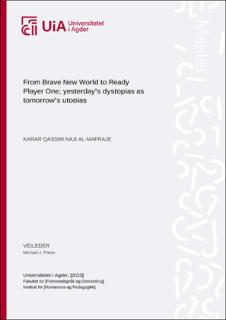From Brave New World to Ready Player One; yesterday's dystopias as tomorrow's utopias
Master thesis
Permanent lenke
https://hdl.handle.net/11250/3072513Utgivelsesdato
2023Metadata
Vis full innførselSamlinger
Sammendrag
The purpose of this thesis is to investigate the evolution of literary utopias and dystopias inlight of what I consider to be the new master narrative of post-humanism. The inspiration forthis project has been Yuval Noah Harari’s Homo Deus (2017), which details some of thechallenges and opportunities we might face in the future. This thesis will therefore explore thethemes of his work and try to assess how this technological and ideological developmentchanges our perception of an ideal society. I start this project by clarifying utopia anddystopia, before delving into a history of post-humanist ideology up to the present moment.This thesis then attempts a reading of Brave New World (1932) by Aldous Huxley and ReadyPlayer One (2011) by Ernest Cline. This reading of these two works will be a twofoldattempt, where a comparison of traditional liberal humanist readings will be compared topost-humanist understandings. What this hopefully highlights is how post-humanism changesthe definitions of what constitutes utopias and dystopias. Finally, I want to compare the twoworks and hopefully glean new insights about how post-humanism redefines ideal visions andideal societies and avoiding the dangers of both utopias and dystopias in the post-human age.
